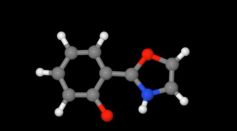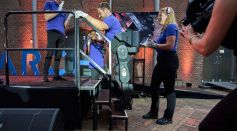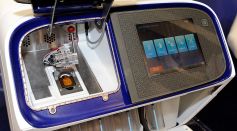Tags: Technology
Looking for Something You May Have Lost? Let This Newly Invented Robot Locate It with 96 Percent Success Rate
Eco-Friendly Mosquito Control Approach: Scientists Develop Technology to Tackle Present, Future Dengue Outbreak
Rocket Engine Construction Using Rapid Unscheduled Disassembly, 3D-Printing Technology Will Fuel Space Race in Private Sector

Researchers Discover New AIEE Aromatic Molecule, Promises Applications in Sensing and Medicine

Powered Exoskeleton Suit: Potential Assistant for Stroke Patients, Elderly and Young People with Cerebral Palsy, Other Disabilities

Measuring Firebrands: New 'Emberometer' Uses 3D Imaging Techniques To Assess Wildfire Threats

Rare Genetic Variants Transferred Between Parents and Children Make It More Likely to Develop Autism
Miniature Particle Accelerator Powers Free-Electron Laser, Opening Possibilities for Smaller, Cheaper FEL Setups
Flexible Computer Processor for IoT Prints Circuits onto Paper, Cardboard, Cloth

Cerebral Palsy Patient Uses 'Eyeharp' to Play Music: Watch How Eye Tracking Technology Made It Possible

Brain Training App: This Mobile Game Can Help You Eat Less, Lose Weight Without Dieting

Clothes Can Produce Clean Energy to Power Electronic Devices, Charge Smart Phones

High-Tech Earring for Cows in Wyoming Ranches Transfers Real-Time Data via Bluetooth

Yuan Longping, the "Father of Hybrid Rice," Dies at 90; Here's How He Changed the World

Superfast DNA Sequencing Tech Lands Finnish "Nobel" Victory to Two British Chemists
Face Recognition System: Website Can Scan Through Over 900 Million Images in Less Than 1 Second
3D Printed Nose Cartilage: Is It a Safer, Easier Alternative for Skin Cancer Patients?
![Science Times - Real-Life Support More Effective for Human Interactions than Social Media [Study]](https://d.sciencetimes.com/en/full/33361/science-times-real-life-support-more-effective-human-interactions-social-media-study.jpg?w=237&h=131&f=c0de24abdd844cf79dd91235e23ed024)
Real-Life Support More Effective for Human Interactions Than Social Media [Study]

Night Mode on Smartphone: Does It Help Improve Sleep? Here’s What Study Finds

4G Network on the Moon: NASA and Nokia Sign Deal to Make It Possible
Most Popular

Starlink Satellite Explodes in Orbit; SpaceX Confirms It'll Re-Enter Earth

Aurora Phenomenon: How Geomagnetic Storms and Space Weather Are Lighting Up the World

Ocean Warming Explained: Why Climate Science Shows Sea Temperature Rise Is Speeding Up

How Wildfires Start, Spread, and Ignite: Understanding the Causes and Fire Behavior Clearly





